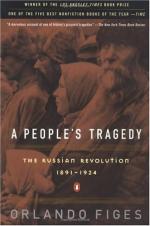|
This section contains 4,282 words (approx. 15 pages at 300 words per page) |

|
Russia 1917
Synopsis
Historians largely agree that revolution was inevitable in Russia after 1861. The maintenance of strict authoritarian rule and the growing separation of people from state created a situation in which any increase in the hardship endured by the Russian workers, soldiers, and peasants could initiate a violent uprising. The revolution of 23-27 February 1917, as denoted by the Julian calendar, began in a bread queue. Following the abdication of Czar Nicholas II, a parliamentary democracy was established, but the state Duma was weak from inception and plagued with attempts at overthrow from both the right and the left. Democracy lasted only eight months. Between 24 and 25 October the Bolsheviks led an armed insurrection supported by a broad coalition of workers and soldiers. This ushered in a new regime that would effect radical change across the economic, political, and social spheres of Russian life. For many, however, life...
|
This section contains 4,282 words (approx. 15 pages at 300 words per page) |

|


